Featured

 The Potomac Institute for Policy Studies recognizes October as Cyber Security Awareness Month. When it comes to Cyber Security, how safe are we? Our experts say, not very. And the problem is expanding as those who try to hack into our lives find new ways to do so. But there are things to be done to help battle against cyber-attacks. At the Potomac Institute, we have warned for years that mitigating cyber-security issues goes well beyond simply downloading patches to fix software. Now, hardware security is also critical to cyber defense.
The Potomac Institute for Policy Studies recognizes October as Cyber Security Awareness Month. When it comes to Cyber Security, how safe are we? Our experts say, not very. And the problem is expanding as those who try to hack into our lives find new ways to do so. But there are things to be done to help battle against cyber-attacks. At the Potomac Institute, we have warned for years that mitigating cyber-security issues goes well beyond simply downloading patches to fix software. Now, hardware security is also critical to cyber defense.
Dr. Mike Fritze, Vice President and Senior Fellow at the Institute says that protecting hardware can prove difficult because of a lack of confidence in the supply chain. “Right now, we can’t guarantee a safe supply chain for hardware. The system is rife with problems. We need to be mindful of those who want to cause us harm and make sure we put our cyber security top of mind,” he said. Dr. Fritze also says the COVID-19 crisis has given us a wake-up call. “The virus has given us an opportunity to see the damaging impact of brittle and unsecure supply chains. This problem is too big for industry alone to handle. We need to create a comprehensive hardware cyber initiative where both industry and government work together,” he said.
Melissa Hathaway, former Cyber Security advisor to both Presidents George W. Bush and Barack Obama, and a Senior Fellow at the Institute takes that notion one step further. She says it’s not just the supply chain that needs closer examination, but the entire ecosystem. Whether we are talking about a router delivered to your home, or an entire weapons system, she says we are vulnerable because our government and corporate leaders have other priorities. She cites the growing number of ransomware attacks and telecommunications outages—specifically, those that knock our businesses and government offline. Ransomware attacks have increased by 700% during COVID-19, targeting healthcare facilities and hospitals as well as key IT business system providers. “We must pay attention to what is happening across our country. The patching cadence of our software and hardware is at a volume that is unsustainable. The decision to embrace and embed often poorly-coded or -engineered, commercial-off-the-shelf technologies into every part of our connected society—from government systems to critical infrastructures and services to businesses and households—is not without consequences. The providers of these technologies—the ICT vendors—are incentivized to be first to market with their products, and the marketplace has simply accepted the vendors’ promise that they will fix or ‘patch’ the flaws in their products later. And these systems are being exploited—we are losing personal information, protected health data, intellectual property—and our services are being knocked off-line at the very time when we as a society are dependent to be on-line and our services available and reliable,” Hathaway said.
What advice should we give to the next Congress and to the Administration? Both Fritze and Hathaway say that until the U.S. government prioritizes cyber security, we will continue to remain vulnerable to attack. Hathaway emphasizes the need for a stable infrastructure. She said, “We need a reliable and affordable Internet and perhaps we should accelerate Amazon, SpaceX, and OneWeb’s ability to meet the demands and service our rural areas.” She also said the country could use a Cyber Health Task Force, potentially using the National Guard to help when a large entity is knocked offline, as happened to Universal Health Services—one of country's largest hospital chains—earlier this month.
Dr. Fritze agrees the government must spend the time and money to ensure these systems are safe and reliable. “The multi-billion dollar price tag currently being considered in the CHIPS and Foundries Acts is money well-spent if it is dedicated to taking action to ensure secure, safe chips and a secure supply chain. It is no longer up for debate. It needs to happen right away,” he said.
At the Potomac Institute, we recognize the expanding threats to an ever-changing cyber world. Cyber threats are yet another form of virus threat. Through independent and objective analysis of the best available data and evidence, we recommend sound policy options to our governmental leaders to combat this ever-growing threat.
About the Potomac Institute
The Potomac Institute for Policy Studies is an independent, non-partisan, 501(c)(3), not-for-profit science and technology policy research institute. The Institute identifies and leads discussion on key science and technology issues facing our society. From these discussions and forums, we develop meaningful policy recommendations and ensure their implementation at the intersection of business and government.
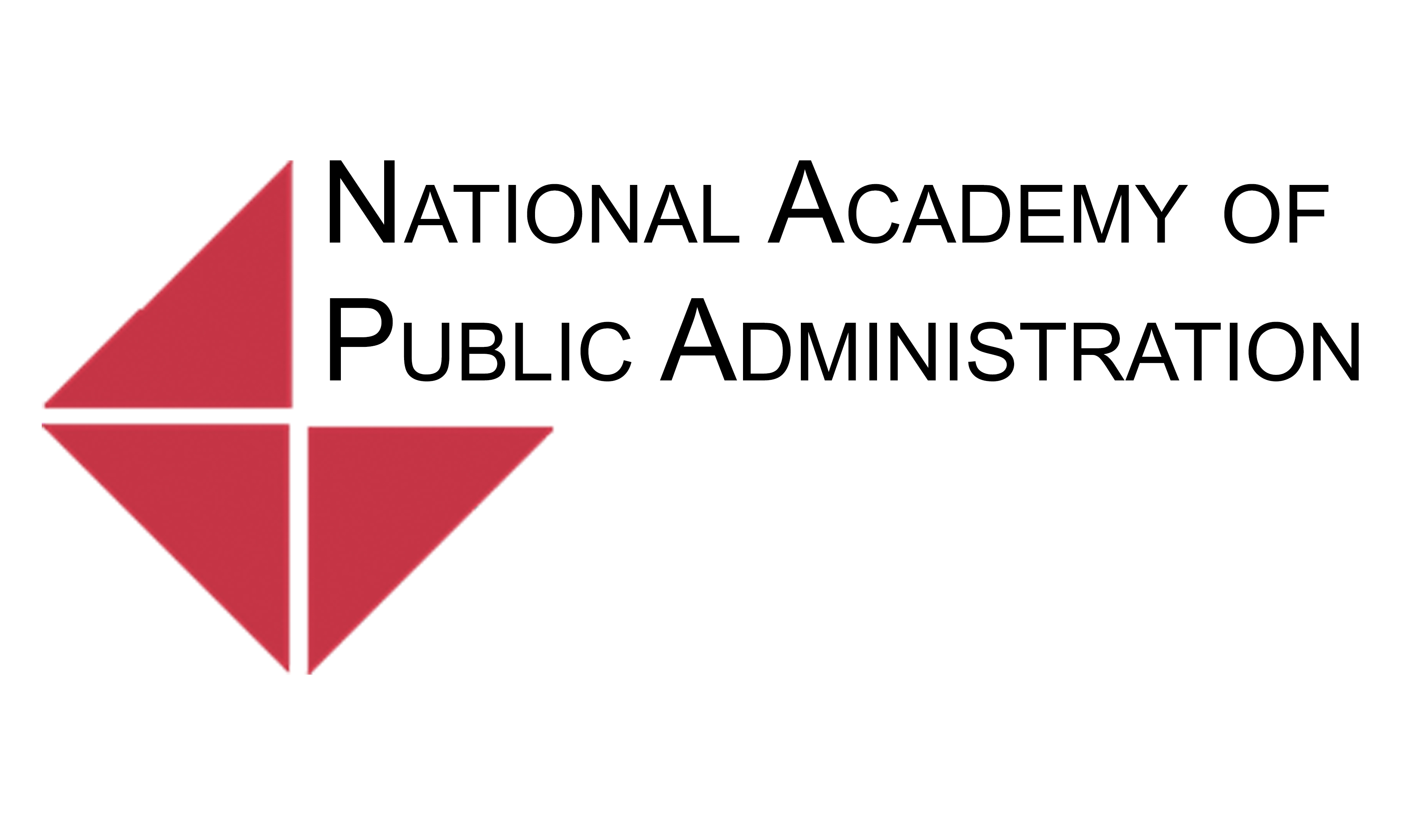
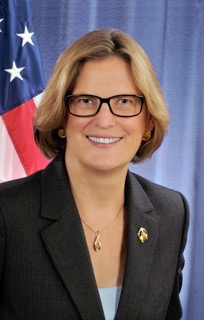 The Potomac Institute for Policy Studies is pleased to announce the selection of Senior Fellow, Dr. Kathryn Sullivan to the 2020 Class of Academy Fellows by the National Academy of Public Administration. Dr. Sullivan is one of only 45 public policy leaders nationwide selected to this year’s class.
The Potomac Institute for Policy Studies is pleased to announce the selection of Senior Fellow, Dr. Kathryn Sullivan to the 2020 Class of Academy Fellows by the National Academy of Public Administration. Dr. Sullivan is one of only 45 public policy leaders nationwide selected to this year’s class.
The Academy said Dr. Sullivan and the other Fellows were selected after a “rigorous review of their contributions to the field of public administration and policy.” The Academy’s Board Chair selected a Fellows Nominating Committee to review credentials, which then made recommendations to the full Fellowship, who then voted on the nominees. The Class of 2020 joins more than 940 Academy Fellows that include former cabinet officers, members of Congress, governors, scholars, business executives, and public administrators, among others. The National Academy of Public Administration is a non-profit, non-partisan organization charter by Congress to assist government leaders in building more effective, accountable, and transparent organizations.
Dr. Sullivan has a distinguished career as a scientist, astronaut, and executive. She was one of the first six women to join the NASA astronaut corps and was the first woman to walk in space. She flew on three space missions while at NASA, including the one that launched the Hubble Space Telescope. She earned her Bachelor of Science degree from the University of California at Santa Cruz, and a Ph.D. in Geology from Dalhousie University in Nova Scotia.
Potomac Institute CEO, Dr. Jennifer Buss said, “We congratulate Dr. Sullivan on this honor. She’s had a stellar career not only with NASA, but in the academic and business worlds, as well. Her contributions and counsel to the Institute are invaluable. It is no surprise to anyone here that she is being recognized for her achievements in public policy.” Dr. Sullivan and the other Fellows selected will be inducted at the Academy’s annual Fall Meeting, which will be held virtually in November.

The Potomac Institute for Policy Studies (PIPS) is excited to announce the return of Dr. Robert (Bob) Hummel as Chief Scientist and Vice President of Research. Dr. Hummel has been with the Institute since 2009, but on assignment under an Intergovernmental Personnel Act (IPA) agreement with the National Geospatial-Intelligence Agency (NGA) for the past four years.
In his role, Dr. Hummel will ensure the studies, reports, and publications of the Institute reflect the highest standards in science, technology, and policy. As Editor-in-Chief of the STEPS (Science, Technology, Engineering, and Policy Studies) journal, he will be soliciting and publishing meaningful articles to address topics of significance and highlight the ongoing work the Institute. “I am looking forward to working with our talented staff in conjunction with oversight by our Board of Regents, Fellows, Senior Fellows, and management at the Institute to amplify our impact in these times of great challenges for national science and technology policy,” said Dr. Hummel.
Dr. Hummel has a storied history and background. His doctorate is in Mathematics, but his academic career spans various aspects of computer science, engineering, and mathematics, especially in the computer vision subfield of artificial intelligence. He was a faculty member at New York University’s Courant Institute for Mathematical Sciences from 1980 to 1997, when he joined the Defense Advanced Research Projects Agency (DARPA) as a program manager. At DARPA, he managed a variety of projects ranging from automated sensing and surveillance systems, automatic target recognition, and Ladar data exploitation. He was also, famously, the technical coordinator and emcee for four consecutive DARPA Tech symposia.
The timing of this announcement is not lost on Dr. Hummel as he and the PIPS family mourn the loss of Founder and CEO, Michael Swetnam. “I am shocked and saddened at the sudden death of our leader and mentor. I had spoken with Mike about my return, and we had wonderful conversations and exchanges concerning plans for new activities at the Institute. Both he and I shared an excitement concerning future initiatives. I intend to carry out the vision that Mike described in our discussions to the best of my ability.”
Potomac Institute President, Dr. Jennifer Buss said, “Dr. Hummel has been an invaluable member of our team for years. His research, publications and constant push for excellence help make us who we are. We warmly welcome him back to the Institute and look forward to working closely with him once again.”
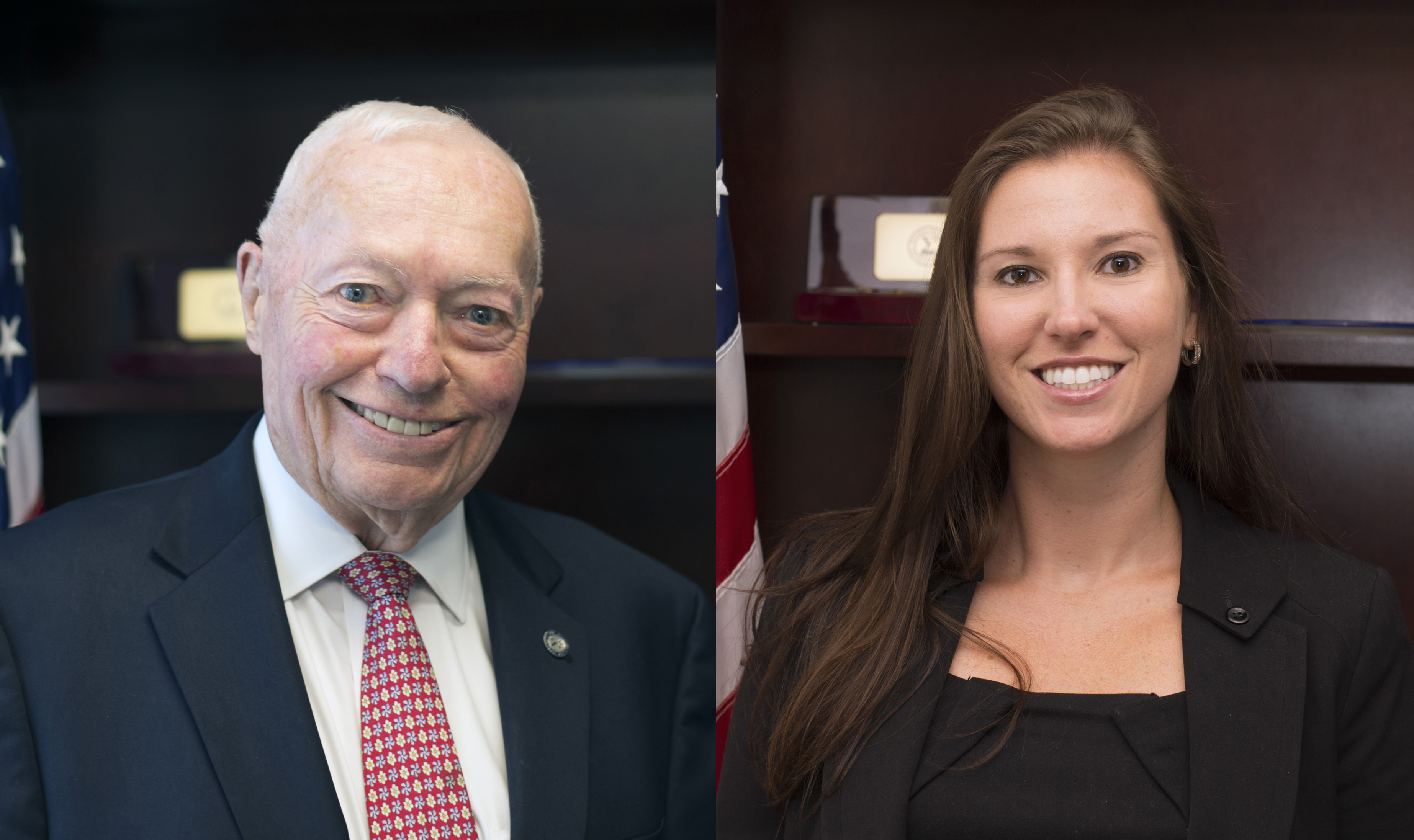
The Board of Directors of the Potomac Institute for Policy Studies is pleased to announce the promotion of Dr. Jennifer Buss to Chief Executive Officer, and selection of General Al Gray as the new Chairman of the Board. Dr. Buss will immediately assume all duties and responsibilities that accompany the CEO position at the Institute. She was also named a member of the Board of Directors.
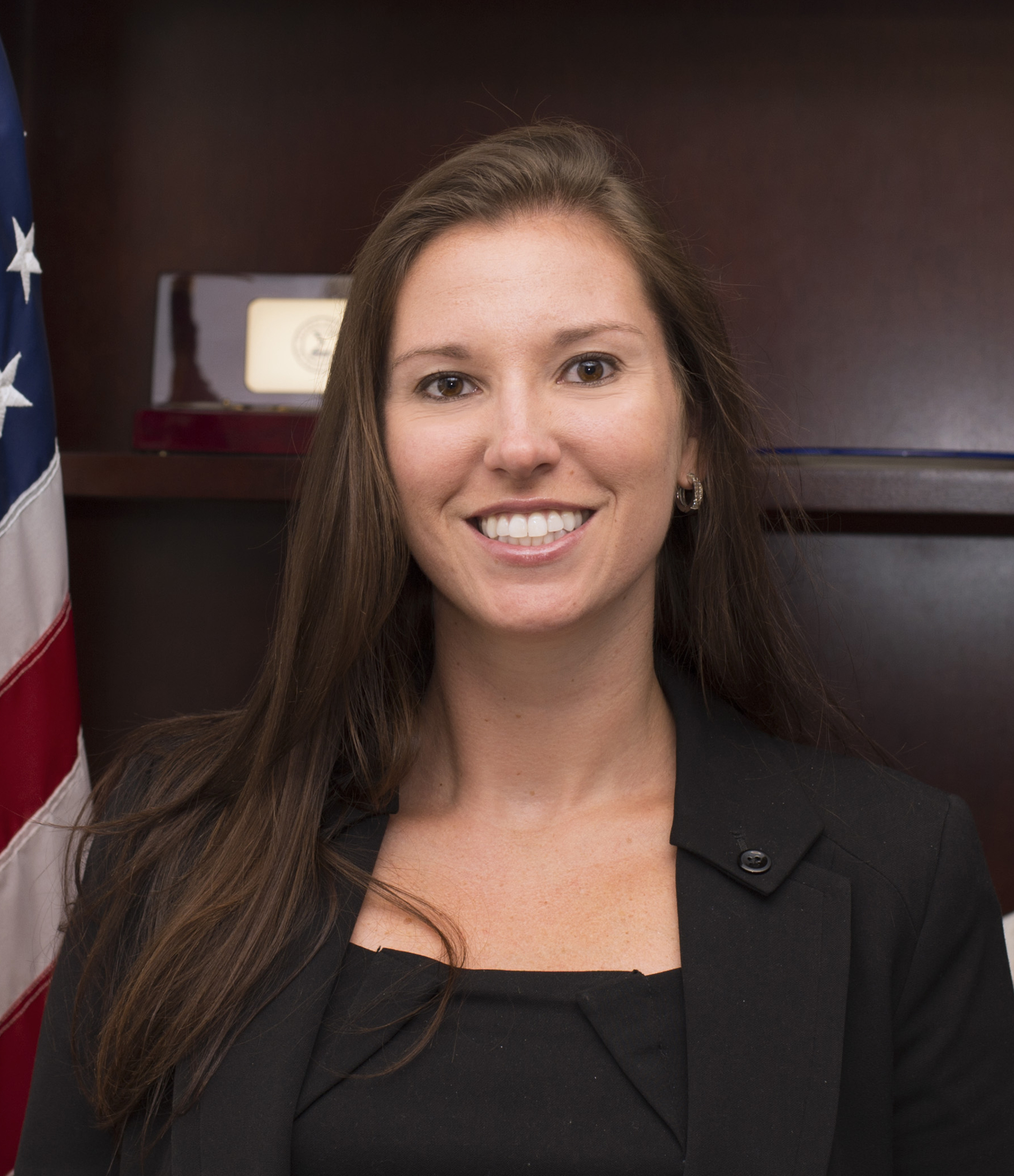 “I am incredibly humbled and honored to lead the Institute. I’ve been invested in its mission since I arrived,” Dr. Buss said. “I am committed to progressing the Institute and its contributions to policy in ever-changing science and technology."
“I am incredibly humbled and honored to lead the Institute. I’ve been invested in its mission since I arrived,” Dr. Buss said. “I am committed to progressing the Institute and its contributions to policy in ever-changing science and technology."
Dr. Buss replaces Mike Swetnam, who passed away in September. “Mike challenged and inspired me every day. It is because of his mentoring, and the leadership of General Al Gray, that I am ready for this new opportunity.”
Since joining the Institute as Research Fellow in 2012, Dr. Buss has written and won dozens of proposals, created several new centers and in her most recent role as President, Dr. Buss has overseen all day-to-day business and operating functions of the Institute. She has also previously served as Assistant Vice President and Vice President. Dr. Buss said, “I am grateful to the Board for having the confidence in my work and abilities to select me for this role. I look forward to proving my worth every day to them, our customers and our team.” Dr. Buss earned her B.S. in Biochemistry with a minor in Mathematics from the University of Delaware, and a Ph.D. in Biochemistry from the University of Maryland.
“Dr. Buss has proven herself as a leader with a savvy mind for business. I’ve seen her grow the Institute and grow with it. She is responsible for the contracts we have today and manages the research teams that perform our crucial work. She has earned this opportunity to guide us into the Institute’s next chapter,” said General Al Gray, USMC, (Ret.), now Chairman of the Board of Directors, who was part of the selection process.
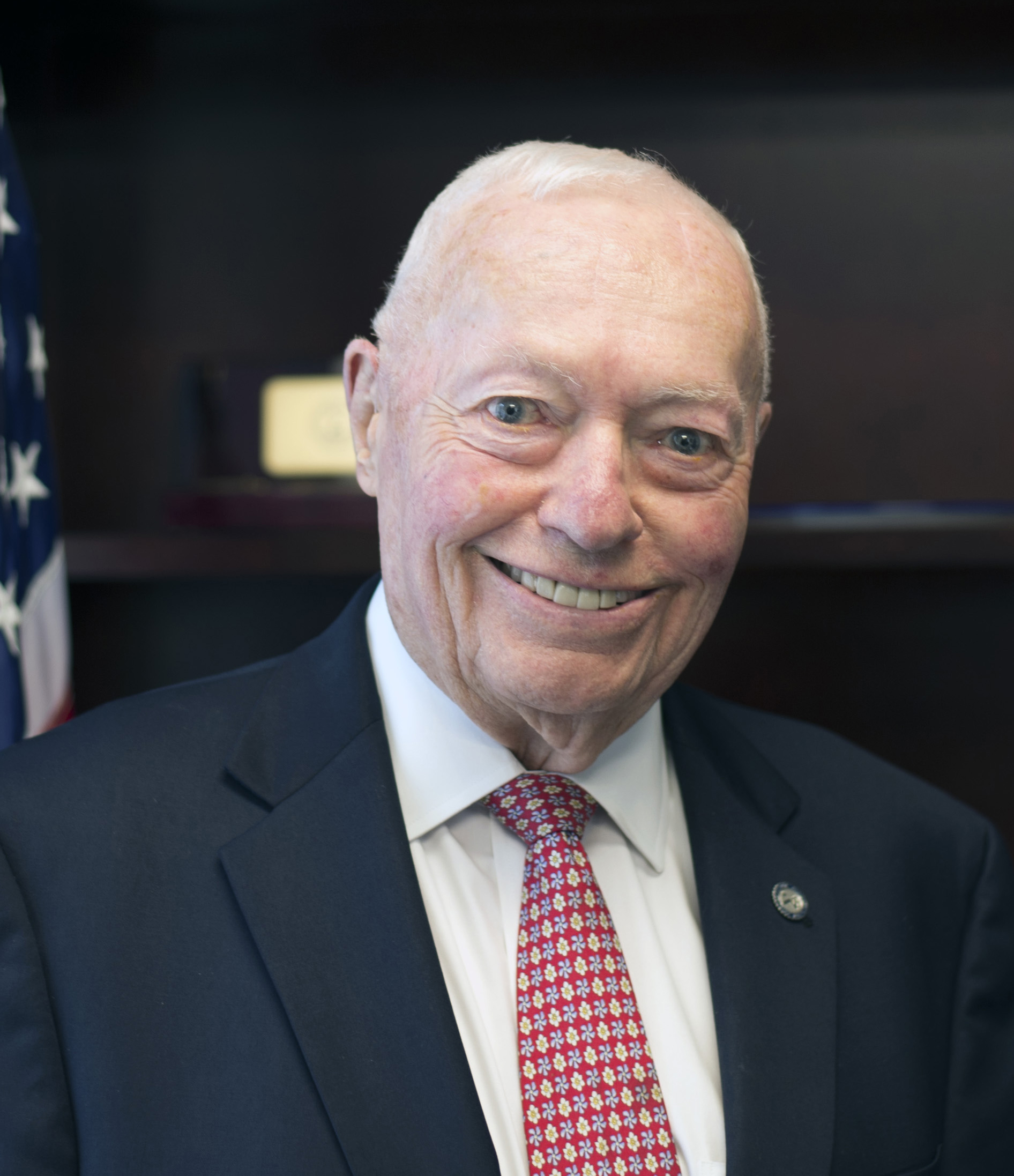 General Gray has been with the Potomac Institute since its inception in 1994. He’s served as Chairman of the Board of Regents and Member of the Board of Directors. He served 41 years in the United States Marine Corps, and from 1987-1991, he served as a member of the Joint Chiefs of Staff, was the 29th Commandant of the Marine Corps, and was advisor to Presidents Ronald Reagan and George H.W. Bush.
General Gray has been with the Potomac Institute since its inception in 1994. He’s served as Chairman of the Board of Regents and Member of the Board of Directors. He served 41 years in the United States Marine Corps, and from 1987-1991, he served as a member of the Joint Chiefs of Staff, was the 29th Commandant of the Marine Corps, and was advisor to Presidents Ronald Reagan and George H.W. Bush.
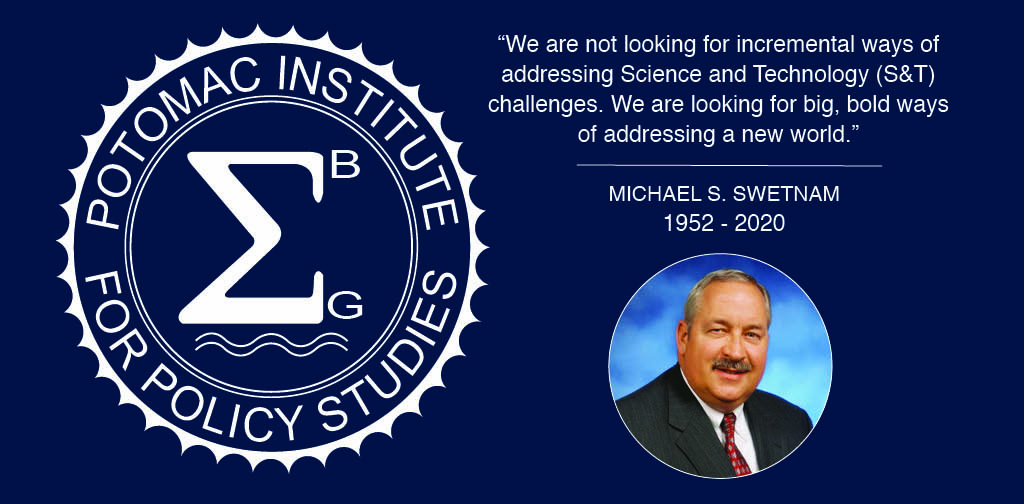

In Memoriam: Michael S. Swetnam, Founder, CEO, and Chairman of the Board, Potomac Institute for Policy Studies
It is with extreme sadness that we share the passing of our leader, colleague, and friend Michael S. Swetnam. He was the Founder, CEO, and Chairman of the Board of the Potomac Institute for Policy Studies. Words cannot express the sorrow upon losing someone so important to the PIPS family.
Mr. Swetnam dedicated his life to the service of our country, spending nearly a quarter century in the U.S. Navy, both as an active and reserve officer. He then worked for the Director of Central Intelligence as a Program Monitor on the Intelligence Committee Staff. He developed and presented the National Security Agency Budget to Congress. He also helped develop, monitor, and present the DOE Intelligence Budget to Congress. From 1990-1992, Mr. Swetnam served as a Special Consultant to President George H. W. Bush’s Foreign Intelligence Advisory Board. There, he provided expert advice on Intelligence Community issues and assisted in authoring the Board’s assessment of Intelligence Community support to Desert Storm and Desert Shield. Before founding the Potomac Institute, Mr. Swetnam worked in the private sector as a Vice President of Engineering at the Pacific-Sierra Research Corporation, Director of Information Processing Systems at GTE, and Manager of Strategic Planning for GTE Government Systems.
Mr. Swetnam was passionate about national security. He authored and co-authored several books and edited many articles on the subject, including: Al-Qa’ida: Ten Years After 9/11 and Beyond, Cyber Terrorism and Information Warfare, and Usama bin Laden’s al-Qaida: Profile of a Terrorist Network. “There have always been small groups and individuals who have threatened societies and nations around the world. The difference today is that advanced technologies, particularly the spread of advanced technologies of mass destruction are enabling these groups to threaten us in a way that, in the past, was reserved only to nation states,” Swetnam once told the Nuclear Threat Initiative Project.
Mr. Swetnam also served on several boards and committees. He’d been a member of the Technical Advisory Group to the United States Senate Select Committee on Intelligence where he provided expert advice to the U.S. Senate on the research and development investment strategy of the Intelligence Community. He was also Chairman of the Term Limits Referendum Committee (1992-93); President (1993) of the Montgomery County Corporate Volunteer Council, Montgomery County Corporate Partnership for Managerial Excellence (1993); and the Maryland Business Roundtable (1993). He was on the Board of Directors of Space and Defense Systems Inc., Dragon Hawk Entertainment Inc., and the Governing Board of the Potomac Institute of New Zealand.
“Mike’s influence spanned decades, both in and out of government. His many contributions to our national security were, at times, concrete and, at times, intangible, but equally significant. He addressed so many issues that his full influence can never be fully measured but is certainly consequential. The Potomac Institute will shine as a lasting symbol and enduring influence. It is his true legacy.”
- Gary L. Sojka, Secretary/Treasurer and Member of the PIPS Board of Directors
One could say the creation of the Potomac Institute for Policy Studies was one of Mr. Swetnam’s “Bold Ideas.” He recognized the importance of Science and Technology and the crucial role they play in our nation’s security. “We are advocating Science and Technology as a part of the full solution that includes economic and social values and indicators because they really do go together,” Swetnam once said. His philosophy for PIPS was to always maintain objectivity and credibility, remaining independent of any federal or state agency, political party, or private concern. He said PIPS is proud to call itself “fiercely objective” by divorcing political issues from policy challenges. He believed the challenge at PIPS is to anticipate the problems our society will face in the future and work toward establishing meaningful policy options for addressing these problems before they come to fruition. He expected a lot from the PIPS team, set a very high bar, but also knew the value of surrounding himself with smart, driven people who he knew would only make the work better.
“Mike always pushed us to do our best. He was very proud of our work in the S&T field, and was happy to stay behind the scenes, while providing invaluable support and advice to the many sectors of government. He always wanted to go the extra mile for our staff."
- Gail Clifford, Potomac Institute VP for Financial Management and CFO
“Mike made sure we had the tools needed to do our jobs and take care of our families at the same time. He was my mentor and friend. He influenced all those he came into contact with, looking to always change things for the better. I can speak for all of us at PIPS when I say Mike was family. He will be truly missed."
- Dr. Jennifer Buss, Potomac Institute President
"Our thoughts, prayers, and condolences are with all of Mike’s family and loved ones as well as his multitude of friends. As we cope with the tragic loss of our beloved leader, and colleague Mike, we at the Potomac Institute for Policy Studies must continue to go forward as Mike would expect us to do. Let's all stick together and make that happen as a lasting tribute to a great American Patriot."
- General Al Gray, USMC (Ret.), Senior Fellow; Chairman, Board of Regents; and Member, Board of Directors
Mr. Swetnam is survived by his son Alex, his daughter Kelly, and his grandchildren, Tommy, Alex, Josh and Bella, and a great-granddaughter, Zoey. Our thoughts and best wishes go out to his family.
